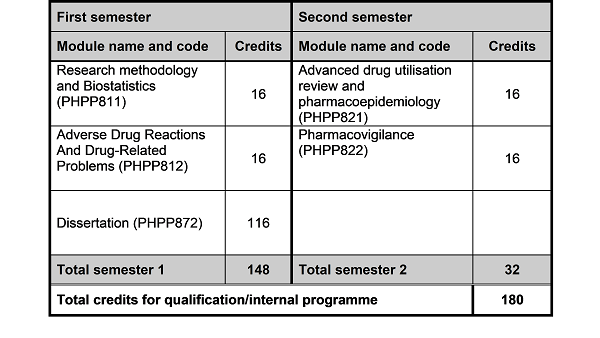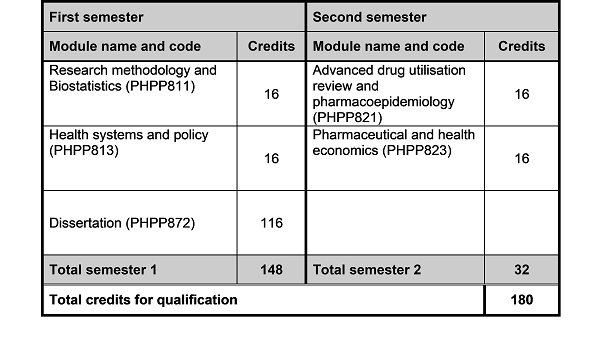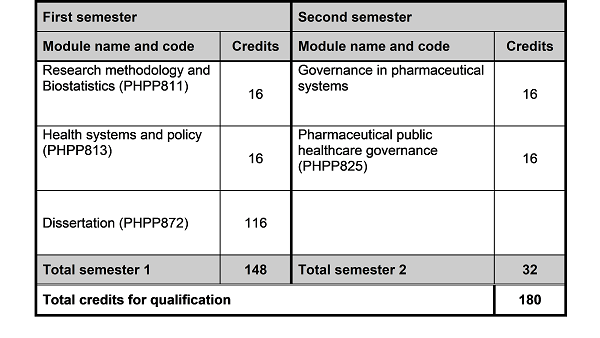The purpose of the MPharm in Pharmacy Practice qualification is to equip postgraduate students to practise at a highly functional level as pharmacists. They can act as role models in both the performance and future development of pharmacy practice, pharmaceutical systems, pharmaceutical public healthcare, pharmacovigilance, pharmacoepidemiology, and pharmaceutical and health economics. This qualification also aims to prepare graduates for further study at NQF level 10.
Through the years the research entity Medicine Usage in South Africa (MUSA) identified the areas below as the most relevant areas of specialisation in Pharmacy Practice. This motivates us to provide the postgraduate student with the option to choose between three internal programmes in the following three areas:
- Pharmacovigilance and Pharmacoepidemiology
- Pharmaceutical Economics and Policy
- Pharmaceutical Public Healthcare Governance
The three internal programmes build upon the knowledge, skills, views, and competence gained from an accredited professional Pharmacy degree programme. Each of the three programmes consists of four core modules (16 credits each) and a dissertation of 116 credits.
All three programmes are presented on a full-time and part-time basis in English.
The minimum duration for the study is one year and the maximum duration two years.
Applications close on 31 August.
Master of Pharmacy in Pharmacy Practice with Pharmacovigilance and Pharmacoepidemiology
The Master of Pharmacy in Pharmacy Practice with Pharmacovigilance and Pharmacoepidemiology addresses the increasing need for well-informed professionals to work in all areas relating to the assessment of drug safety and risk benefit of drug use. This programme will help health professionals to acquire advanced clinical knowledge and to train a new generation of healthcare professionals who will advance this specialised field.
The structure of the programme is as follows:
Qualification and programme code: 8ED P01; Curriculum code: G801P

Contact us:
Prof Johanita R Burger
- (018) 299 2285
- Johanita.Burger@nwu.ac.za
Prof Martie S Lubbe
- (018) 299 2288
- Martie.Lubbe@nwu.ac.za
Master of Pharmacy in Pharmacy Practice with Pharmaceutical Economics and Policy
The purpose of the Master of Pharmacy in Pharmacy Practice with Pharmaceutical Economics and Policy is to provide specialised training in the theory and practice of economics as applied to the delivery of healthcare services, diseases and medicine. This provides the experience and skills needed for informed healthcare service decision-making, advanced research and academic capacity in this discipline. The programme covers issues such as health and healthcare systems, methods of economic evaluation, setting priorities using health and pharmaceutical economics, pharmacoepidemiology, and the interface between health and pharmaceutical economics and health and pharmaceutical policy.
The structure of the programme is as follows:
Qualification and programme code: 8ED P02; Curriculum code: G801P

Contact us:
Dr Rianda Joubert
- (018) 299 4290
- Rianda.Joubert@nwu.ac.za
Prof Johanita R Burger
- (018) 299 2285
- Johanita.Burger@nwu.ac.za
Master of Pharmacy in Pharmacy Practice with Pharmaceutical Public Healthcare Governance
The Master of Pharmacy in Pharmacy Practice with Pharmaceutical Public Healthcare Governance programme is designed with the needs of the 21st-century pharmaceutical public-healthcare practitioner in mind. This programme will help postgraduate students to acquire the ability to apply specialised knowledge and professional skills to understand issues surrounding the governance of pharmaceutical public-health and medicine supply management in healthcare systems.
The structure of the programme is as follows:
Qualification and programme code: 8ED P03; Curriculum code: G801P

Contact us:
Dr Irma Kotzé
- (018) 299 2239
- Irma.Kotze@nwu.ac.za
Prof Martie S Lubbe
- (018) 299 2288
- Martie.Lubbe@nwu.ac.za
Admission requirements of the qualification
- A BPharm degree or a relevant health-science qualification approved by the Senate is required.
- Admission to the programme/curriculum is determined through selection by the MUSA scientific committee.
- Selection is subject to academic performance, practical considerations and capacity and expertise available in the research entity and subject group.
- Prospective students are recommended to have achieved at least an average of 60% in the first semester of the final year of the BPharm degree (preferably for fourth-year BPharm students), or to provide equivalent evidence of competency (e.g. international students).
- Practice experience and prior learning in the field of pharmacy will be an advantage.
